Foursquare has come a long way since its early days as a check-in app. Today, it stands at the forefront of geospatial technology, providing the location intelligence that powers everything from app experiences and mobility services to advertising and analytics. If your brand depends on accurate, real-time data about the physical world, Foursquare’s evolution has big implications for your local visibility management and performance.

From App to Location Infrastructure
Foursquare now operates one of the most trusted and widely used location data platforms. Its proprietary database spans over 120 million global points of interest (POIs), trusted by more than 550 enterprise partners including major players in tech and media.
Foursquare’s location data powers some of the world’s most-used consumer apps—including Uber, Snapchat, X (formerly Twitter), and Nextdoor, enabling these platforms to deliver precise, real-time local experiences through verified POI data.
Whether you’re building a consumer app, personalizing ad campaigns, optimizing retail strategies, or training AI models, Foursquare’s data and APIs offer unmatched precision and scale. Use cases include:
- Delivering verified, continuously updated POI data to power apps and platforms
- Fueling real-world behavioral targeting in advertising and attribution
- Supporting urban planning, logistics, and market research with spatial context.
The Rise of Location Harmonization
One of the most critical challenges brands face today is consistency, ensuring your location appears accurately across the fragmented digital ecosystem. Foursquare addresses this head-on through advanced location harmonization capabilities powered by proprietary machine learning, spatial matching, and deduplication technologies. This means your business information is not only visible, but reliable, across platforms, apps, and search tools.
Open Access, Better Accuracy
Foursquare recently introduced its Open Source Places dataset, making a foundational subset of its POI data freely accessible to developers, nonprofits, and the general public.
This move means:
- More developers can access and contribute to a global dataset of real-world locations
- Greater transparency in how POI data is created and maintained
- Opportunities for better standardization and accuracy across platforms.
How PinMeTo Fits In
PinMeTo pushes verified business data to Foursquare as part of our broader local search and listing management ecosystem. That means multi-location brands using PinMeTo have their location information synced directly into one of the most widely used POI datasets—without extra work. For our customers, this means:
- Expanded Visibility: Your store data doesn’t just live on Google—it travels with your customers wherever they search or navigate.
- Data Accuracy: You maintain central control, while your brand stays visible on decentralized, high-impact platforms.
- Less Manual Work: Updates made in PinMeTo automatically flow to Foursquare, ensuring consistency without extra effort.
To Sum Up
Accurate, verified location data is the backbone of modern digital discovery. With Foursquare evolving into a powerful open mapping platform, its influence reaches far beyond its original check-in roots, fueling everything from in-app recommendations to navigation systems and local business directories.


